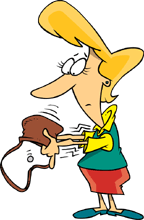
Weekly Gems from Ronda Gates.
 | Weekly Message
Weekly Gems from Ronda Gates. |
|
There is a downside to our interest in good health. It's simply impossible for us to be able to ferret fact from fiction in our media-saturated world. So, we are vulnerable to tricksters, savvy marketing professionals and flat-out dishonest people willing to use skillful ploys to hoodwink us into handing over our money for worthless or even dangerous advice, products, and procedures. "Fraud" and "quackery" are words health promotion professionals use to describe these products and programs that contrast with reliable, scientifically based information about health issues. To identify fraud and quackery, look for these signs: 1. Claims that provide solutions that sound "magical" or that present enticingly simple and logical-sounding answers to complex problems. You can be especially vulnerable when people are talking about metabolism. Our metabolism simply doesn't work in a logical way. That's why we survive critical disease, bad eating habits and an inactive lifestyle. Our miraculous bodies fly in the face of logic. 2. Distrust of the current methods of medicine or suspicion of the regular food supply, with "alternatives" for sale (providing profit to the seller) under the guise that people should have freedom of choice. Beware of anyone claiming to be persecuted by the medical establishment -- it means an amateur is making your diagnosis. (These charlatans often try to convince you that physicians want to keep you ill so that you will continue to pay for office visits.)  3. Evidence in the form of testimonials, case histories, and other nonscientific support for their claims. It's not unusual for a sales department to have more negative comments about a product and choose to use only the positive comments when ads are created Usually these recommendations are carefully selected with words often taken out of context. Some advertisers stoop to creating using the name of a person who doesn't exist. Everyone is passionate about something. Remember famous personalities are paid big bucks for their support. 4. Evidence from "unpublished studies." Valid scientific studies are published in reputable scientific journals. 5. In tiny print, somewhere on a page, the word "Advertisement." 6. Evidence that is purported to be valid because the person has a M. D. or Ph.D. or "has studied at a reputable institution." (Anyone can audit classes at almost any institution.) I once reviewed an audio tape solicitation for a weight loss product recommended by "a doctor." Turned out he was a doctor of veterinary medicine! Be a savvy consumer. WATCH OUT FOR THESE: Logic without proof - Motive: personal gain - Authority not cited - Unreliable publication - Fake credentials - Advertisement - Unpublished studies - Testimonials - Suspicions about food supply - Persecution claims - Simple answers - Too good to be true. |
| Weekly Messages | Lifestyles |
|
|
1378 Casada Ct, Leisure World Mesa, AZ 85206 Phone: 480-242-4812 |
| Web Site Design by JDL Design | |